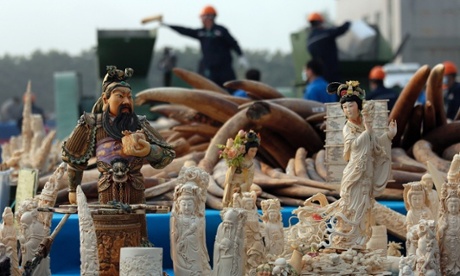London wildlife crime summit: all eyes on China
No matter what is agreed and how much money is raised, little will change without China’s endorsement of a domestic ban of trade in ivory and rhino horn

A summit at Lancaster House in London today, attended by high-level delegations from more than 50 countries, will discuss “urgent measures” to stop the illegal trade in products of three endangered wildlife species: elephants, rhinos and tigers. Following recent intergovernmental meetings hosted by Cites and the IUCN, all agree that we are facing a crisis and something must be done. But this meeting is the big one: it’s make or break time. The UK government hosting the event, and its royal backers, will be fervently hoping for a successful outcome that makes for positive headlines on Friday morning. But all eyes will be on one delegation: China.
With regard to the two African species, elephants and rhinos, progress is being made. The government of my country, Kenya, has passed – and is enacting – tough new anti-trafficking laws. The US, no doubt with an eye to stealing the headlines, has just announced a complete ban on trade in ivory. Prince William will be launching United for Wildlife, a collaboration between seven international NGOs, and a new African organization, Stop Ivory, has been formed to work with governments, NGOs, and the private sector to remove ivory from stockpiles and support governments’ efforts to implement their elephant action plans. But populations of elephants and rhinos are falling, mainly as a result of slaughter and trafficking controlled by criminal gangs based in China. No matter what is agreed at the conference and how much money is raised, if it fails to get China’s endorsement of a domestic ban of trade in ivory and rhino horn, little will change.
It has been suggested that western nations are wary of upsetting the Chinese government by engaging on this issue. They shouldn’t be. Calling for a crackdown on illegal trade in ivory doesn’t pose any existential threat to China, politically or economically. Chinese leaders are pragmatists. They will know they have nothing lose by combating domestic organised crime. Their presence at the conference shows that they appreciate the extent of global concern for the future of these emblematic species, as do their recent actions, including the public destruction of some ivory stockpiles and the arrest of an ivory smuggling gang leader extradited from Kenya. This conference is an opportunity for the Chinese, not a threat. Western delegates should stress the huge global prestige that China could gain by being seen to take a lead on this issue.
Africa is waking up to the reality of the loss of elephants. Countries that were hard-nosed about their right to sell ivory, including Tanzania and Botswana, have agreed to stop, as they recognise that selling ivory just feeds the illegal demand. But African countries don’t have the resources to fight organised wildlife crime on their own. They need support from global agencies and western governments. In fact, it can be argued that Africa needs support from the west to counter organised crime more than it needs economic aid. But above all, African countries need China to take action to stop its citizens pillaging the continent’s heritage.
The partnership between China and Africa is becoming a key driver of global socio-economic development, with the potential to lift billions out of poverty. Africans understand that development carries environmental costs, and that difficult trade-offs often have to be made. But in dealings with the Chinese, African leaders should make it clear that the future of rhinos and elephants is not up for negotiation – and that the announcement of effective action to defeat wildlife crime would boost their standing immeasurably on the African continent. African delegations will then be able to greet the Chinese with outstretched hands, not asking for money, but to shake on new partnerships.
No comments:
Post a Comment
Comments always welcome!